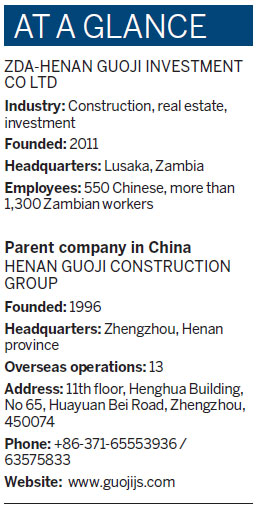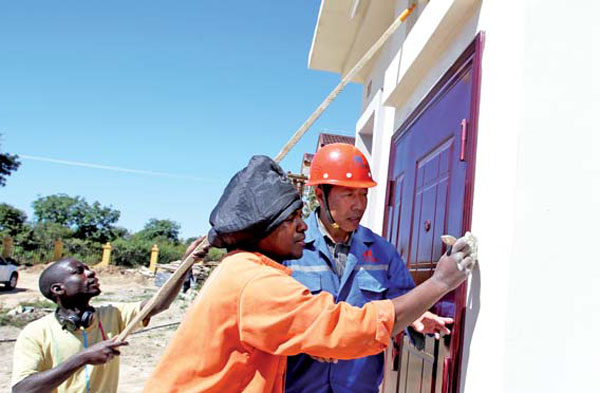Bricks, mortar and friendship add up
By Li Fangchao and Joseph Catanzaro (China Daily Africa) Updated: 2014-06-27 09:15
|
Guan Tingzhong, general manager of ZDA-Henan Guoji Investment Co, and his deputy manager Richard Chavula explain a residential housing project in Zambia. Zhang Wei / China Daily |
|
Chinese and local workers on the construction site of Henan Guoji's housing project in Zambia. |
Chinese company in Africa for long haul is attentive to local culture and insists on giving back
Guan Tingzhong believes the secret of business success in Africa is making friends first.
Guan is general manager of ZDA-Henan Guoji Investment Co, a partnership between Guan's company and the Zambia Development Agency, a government agency that promotes trade and investment.
While developing a residential housing project in 2011, Guan and his team caught the agency's attention, and the joint company was formed soon after to develop houses for government employees.
"ZDA is well aware of how much experience we have in real estate development, and as an investment promotion agency ZDA is highly influential," Guan says. "So we both win out of this."
The company is now working on a $50 million project to develop 1,000 houses for government employees, near the airport of the capital, Lusaka.

Workers are now finishing up the interiors and furnishings of 500 of the houses that are nearing completion. Zhang Junkai, Guoji's construction site manager, says about 60 Chinese and 1,500 locals work on the site.
The houses, of various sizes, come in three price ranges, $40,000-$50,000, $60,000-$100,000 and $100,000-$200,000, and all have been sold, Zhang says. Some prospective owners helped design the interiors, he says.
A kindergarten, shopping mall and clinics will soon be built in the area.
Michael Chileshe, a project surveyor, says such community housing is a first for the capital.
"We don't have communities like this in Lusaka. It is well designed to have all the facilities around it. Economically, Zambia is moving ahead. We are moving toward being a low-middle income nation. So we have a lot of upwardly mobile people, young professionals, managers, retired public servants, and these are the kinds of people who will live here."
Guan says Guoji has helped buyers secure mortgages.
Real estate is a burgeoning business in Africa, he says.
"There is a huge shortage of housing. The market is there, people have no house, but they also have no money, especially low-income people."
Richard Chavula, deputy general manager of Guoji, reckons Zambia, which has a population of 13.8 million, is short of 3 million houses. Two-thirds of the country's homes are informal, he says, meaning they are not properly planned, and many of them are shanties.

"More and more young people leave their parents' home every year, and the only place they can live in is informal housing. With the help of companies such as Henan Guoji and others, they can have access to high-quality housing."
Companies from other countries, including Australia and India, have also invested heavily in Zambia, Guan says, and Chinese companies are at a disadvantage compared with them because of language.
"If you cannot speak English, you cannot communicate with local staff and it may cause a lot of misunderstanding."
Chinese companies need to be aware of cultural differences, he says.
"For instance, I find my Zambian workers don't like smoking, so all the Chinese workers now smoke outside, not in the office. If you communicate with local people properly and respect their culture, it's easy to work together."
Since Guoji came to Africa more than 10 years ago, the company has expanded greatly and is now working on projects in 17 countries in the continent.
In all of these countries, Guoji is trying to team up with local government agencies to do business, Guan says.
Guan dismisses fears of business partnerships dissolving if there are changes of leadership in a country.
"It doesn't matter what country you're in, or who is in power - they all need investment and they all need development."
Partnerships and businesses should survive as long as those involved abide by the law and follow local rules, he says.
Chavula, the deputy general manager, says Chinese companies have brought investment, technology and jobs to Zambia.
"I am very impressed by Chinese workers' dedication. Guoji has built 500 houses in just two years. At that rate, in 10 years the city will have been transformed."
As Guoji's business expands in Africa, Guan says, the company has found a way to put money back into the community, donating a primary school and a clinic in Zambia.
The company also funds a program allowing Africans to study at Zhengzhou University in Henan province.
"The university has a class that consists of students from African countries where we have projects," Guan says.
Each year, three to five students from each country are selected, and after two years of study, including language learning, they return to work for Guoji in their home countries.
"Making money is not the only mission here," Guan says. "Enlarging our business and spreading our good name are also very important."
Guoji has started expanding in Zambia by getting more projects in other provinces, and the company is looking at going into the commercial property business.
"Shopping malls, hotels, office buildings, commercial streets - we have many things on the agenda," Chavula says.
Guan says his company is in Africa to stay, and the way to grow is to find reliable local partners.
"Profit is important, but if you want to make your company big, you have to think win-win. If you only consider yourself and profit, then after one project is done, that is the end of collaboration.
"On the basis of both sides gaining, we are willing to share more of the profits with our local partners. We're always thinking about them."
Contact the writers through lifangchao@chinadaily.com.cn












